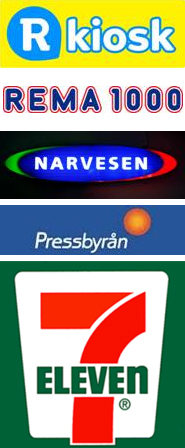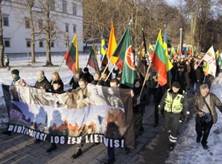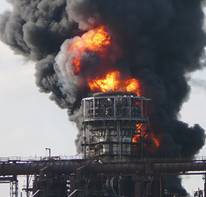
THE VOICE OF INTERNATIONAL LITHUANIA
|
VilNews has its own Google archive! Type a word in the above search box to find any article.
You can also follow us on Facebook. We have two different pages. Click to open and join.
|
Archive for March, 2012
Putin won, but Russians are growing tired of a political system that entrenches the privileges of an oligarchy of businessmen, bureaucrats and security men
- Posted by - (0) Comment
![]()

Illustration: http://vozni.wordpress.com
The Russian presidential campaign has hardly been short on drama: blood-curdling speeches, outbreaks of protest, the reported thwarting of an assassination plot. In the end, however, the result will be the same as could have been predicted months – or even years – ago. Vladimir Putin will return to the office he left in 2008, with the current president, Dmitri Medvedev, going back to his old job as prime minister.
On the face of it, then, this election means business as usual: Putin and his sidekick back in charge for another six years, and possibly 12.
Yet in fact, it represents something of a watershed for Russia. In the wake of those rigged elections, dissent is growing. Mr Putin has cast himself as the scourge of corruption, the man who tamed the gangsters. Yet Russians are growing tired of a political system that entrenches the privileges of an oligarchy of businessmen, bureaucrats and security men, and of an economy that depends on the fluctuating price of oil and gas rather than the skills and ideas of its workforce.
Mr Putin is still a popular figure, thanks largely to the cult of personality that surrounds him. Yet many of those voting for him yesterday were making a negative choice, rather than a positive one: they support him out of fear of a return to the chaos of the post-Soviet era, and in the absence (thanks to the Kremlin’s own strenuous efforts) of any credible alternative. With opponents of the regime growing increasingly vocal, we suspect he will find his next term in office a great deal more testing than the last.
- Bookmark :
- Digg
- del.icio.us
- Stumbleupon
- Redit it
![]()

Norwegian Reitan Servicehandel (RSH) has acquired more than 1.000 kiosks from the Finnish media company Sanoma OY in Finland, Estonia and Lithuania. The purchase price is approx. 130 million Euros. As a result of the latest acquisition, Magnus Reitan will manage more than 2.500 stores with close to NOK 14 billion in revenue and 18.000 employees in seven countries.
- This acquisition makes us Europe's second largest convenience store operator, an achievement of which we are very proud. All of the chains have a leading position in their respective markets, and it is with great humility we are going to further develop these brands in Finland, Estonia and Lithuania, Reitan Servicehandel CEO Magnus Reitan says.
The revenue in Finland, Estonia and Lithuania is to a great extent based on traditional newsstand products such as tobacco, magazines and lottery, while Narvesen and Pressbyran to a larger degree have developed new and profitable product groups such as meals to go, drinks and electronic services.
Reitan Servicehandel (RSH) comprises Narvesen in Norway and Latvia, Pressbyran in Sweden, and 7-Eleven in Norway, Sweden and Denmark. RSH holds a leading position in all four countries. As of 31 December 2011 the number of shops was 1.489, and RSH had revenues of NOK 11.4 billion in 2011.
Reitan Servicehandel is a part of the Reitan Group (Reitangruppen). The Reitan Group consists of four areas of operation: REMA 1000, Reitan Servicehandel, Reitan Real Estate (Reitan Eiendom) and the Uno-X Group. In addition, Reitan Group owns the subsidiary Spaceworld and holds a share of 15,62 percent in Axfood. Reitan Group's vision is to become known as Scandinavia's most value driven company. In 2011, Reitan Group had revenue of NOK 63 billion (including franchise turnover) and employed 27.500 people in Scandinavia and Latvia, making it one of Norway's ten largest companies.
- Bookmark :
- Digg
- del.icio.us
- Stumbleupon
- Redit it
- Posted by - (0) Comment
11 March marks the restoration of
Lithuania's independence – how can the
authorities allow neo-Nazis to dominate
this important day for the nation?
 Lithuanians marching for freedom, 10 January 1990. Photo: Vitaly Armand/AFP/Getty Images |
 Neo-Nazis marching in Vilnius 11 March 2010. Photo: http://defendinghistory.com |
For the fifth time in the past five years a neo-Nazi parade (this year with a permit enabling a maximum of 2,000 participants) will march through the heart of Vilnius on 11 March, Independence Day, one of the proudest and most significant days for the people of Lithuania. The neo-Nazi theme will be “Homeland.”
Their display, if permitted by the government, will be taken by extremists throughout the region and Europe as a stamp of growing approval of neo-Nazi activities and a signal that the murder of about 95% of Lithuania’s Jewry during the Holocaust, largely by local collaborators, is taken lightly by today’s government.
Help us ban this blemish on a day reserved for the celebration of the internationally acclaimed bravery of the March 11th 1990 declaration of independence that was and continues to be a source of inspiration to all nations seeking freedom from oppression and foreign domination. Allow Lithuania a Day of Dignity.
Help combat racism and anti-Semitism with your signature to the following petition. You’ll find the petition text HERE.
11 March is not a day to
glorify the perpetrators

By Olga Zabludoff
When I learned that the municipality of Vilnius had again issued permits for a neo-Nazi march on Lithuania’s March 11th Independence Day, I was disturbed for more than one reason. Why would the government, which has been purporting its wish for reconciliation with its small Lithuanian Jewish community and Jews everywhere, sanction the resurrection of a Holocaust image? Why would the government, which has been purporting its wish to better its tarnished image with worldwide Jewry, accept and endorse the display of the LAF white armbands imprinted with the flaming swastika? Most survivors of the Lithuanian Holocaust are more traumatized by memories of the white-armbanded Lithuanian Activist Front than by memories of Hitler’s Aryan henchmen. It was the local LAF murderers who began to butcher Jews who had been their neighbors -- this even before their German Nazi masters/commanders came upon the scene. It was the LAF who unleashed the Holocaust in Lithuania. It was then that their slogan was born: “Lithuania for Lithuanians!” (Lietuva Lietuviams).
- Bookmark :
- Digg
- del.icio.us
- Stumbleupon
- Redit it
It is possible to offer some counterweight
- Posted by - (0) Comment

By: Myra Sklarew
When I stood in Rotuses Square in Kaunas last September, I listened to a young man speak about the burden he had carried in his young life to know that his own grandfather had been one of the killers during the War, a member of the Lithuanian Activist Front and part of a mobile killing unit. The young man asked forgiveness.
And when I stood with a group of some fifty people next to the place of massacre of over 2000 Jewish people in Kedainiai—a place where twenty-nine of my own family members were murdered, I saw how Lithuanians were making the enormous passage across time and cultural divide to embrace a wrong that they had nothing to do with. I ask myself if I have done enough in my own country to right the wrongs committed by my forebears.
- Bookmark :
- Digg
- del.icio.us
- Stumbleupon
- Redit it
Lithuania rescues 200 fisherman on ice floe
- Posted by - (0) Comment
![]()

Emergency crews in Lithuania rescued around 200 fishermen stranded on an ice floe in the Curonian Lagoon at Lithuania’s West Coast.
Two border patrol boats and a military helicopter were used in the operation Friday, and rescue coordinator Antanas Brencius said no one was injured.
Brencius says a crack in the ice in the Curonian Lagoon was widened by the northern winds, to the extent that the fishermen could not cross it and return to shore.
The freshwater lagoon is a popular fishing and holiday resort on the Baltic Sea.
- Bookmark :
- Digg
- del.icio.us
- Stumbleupon
- Redit it
Two workers die at Mažeikių Nafta
- Posted by - (0) Comment
![]()

Two workers have died at the Mazeikiu Nafta oil refinery in Lithuania after a vacuum tank exploded.
Refinery spokesman Andrius Stasiulaitis says the blast had a limited scope and has not affected overall operations at the plant, which is owned by Poland's PKN Orlen and is the largest enterprise in Lithuania in terms of revenues and taxes paid.
Stasiulaitis said Friday that the explosion killed two workers ages 48 and 51, and that an investigation has been launched.
A major fire broke at the refinery in 2007, causing some €38 million in damages and a significant decline in output.
- Bookmark :
- Digg
- del.icio.us
- Stumbleupon
- Redit it
Some fresh pictures from Kaziuko Muge 2012
- Posted by - (0) Comment
- Bookmark :
- Digg
- del.icio.us
- Stumbleupon
- Redit it
Warsaw is this week ‘decorated’ with photos of Norwegian neo-Nazi mass murderer
- Posted by - (0) Comment
![]() Some Eastern Europe countries have seemingly not realized how dangerous it can be to provide neo-Nazis room for their 'presentations'.
Some Eastern Europe countries have seemingly not realized how dangerous it can be to provide neo-Nazis room for their 'presentations'.
We Norwegians had to bitterly experience how dangerous such mindsets can be, last summer when the neo-Nazi Anders Behring Breivik cold-bloodedly murdered 77 innocent people. We will earnestly suggest that the rest of Europe try to learn from what happened in Norway 22 July 2011, not allowing neo-Nazi marches, posters or other kinds of space for spreading the dangerous messages and history falsifications these people represent. Norway had to learn it the hard way...

Portrait of the Norwegian neo-Nazi mass murderer Anders Behring Breivik all over Warsaw these days.
Photo: www.vg.no
Throughout the Polish capital's bus stops are these days covered with meter-high portraits of Anders Behring Breivik, the Norwegian neo-Nazi who brutally murdered 77 persons last summer.
The posters are made of one of the pictures Breivik used for the so-called manifesto he sent out after the terrorist attacks on 22 last July.
The portrait is in black and white and pixel led, but you can clearly see who the posters are representing.
According AP, a lot of of Norwegians who have been on holiday in the Polish capital, reacted to the massive posters with disbelief.
Read the article
(in Norwegian)...
- Bookmark :
- Digg
- del.icio.us
- Stumbleupon
- Redit it
VilNews e-magazine is published in Vilnius, Lithuania. Editor-in-Chief: Mr. Aage Myhre. Inquires to the editors: editor@VilNews.com.
Code of Ethics: See Section 2 – about VilNews. VilNews is not responsible for content on external links/web pages.
HOW TO ADVERTISE IN VILNEWS.
All content is copyrighted © 2011. UAB ‘VilNews’.

 Click on the buttons to open and read each of VilNews' 18 sub-sections
Click on the buttons to open and read each of VilNews' 18 sub-sections 















.jpg)



